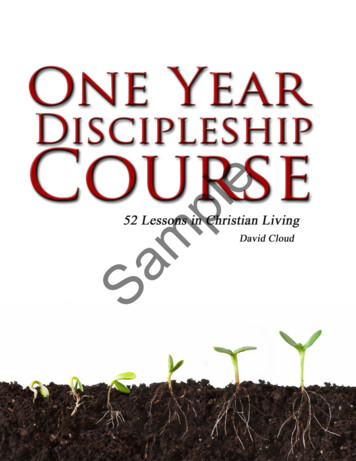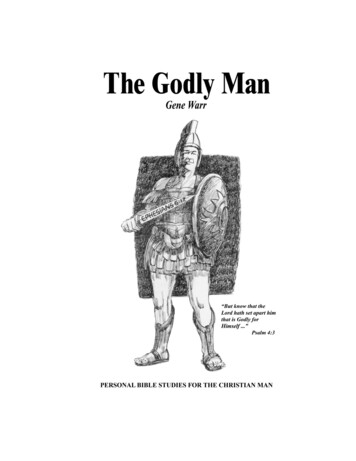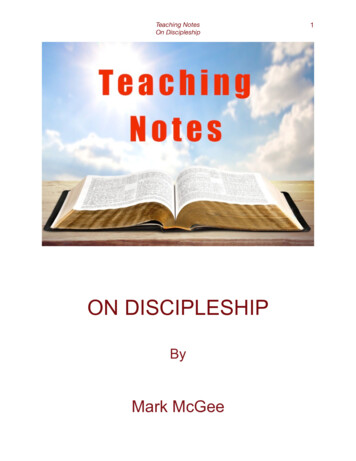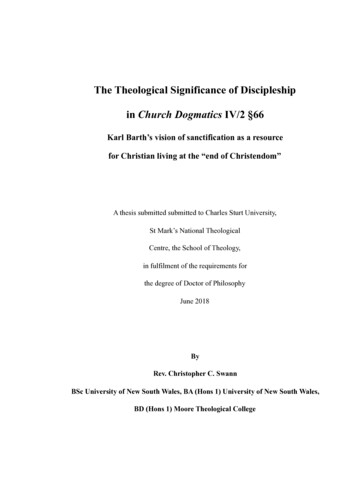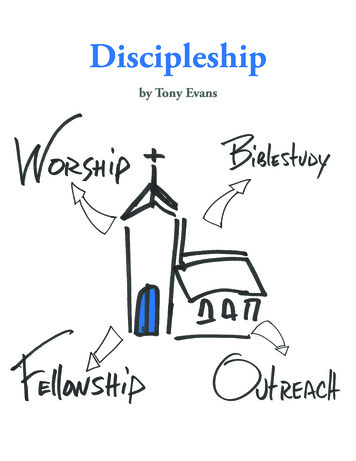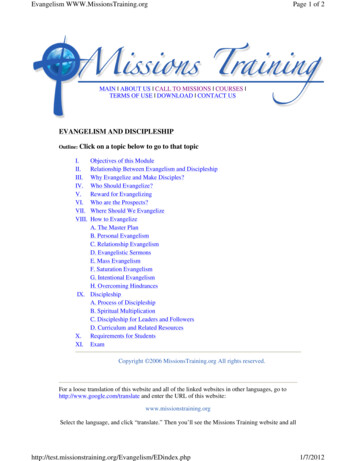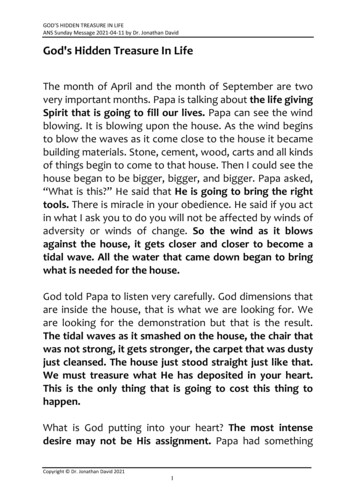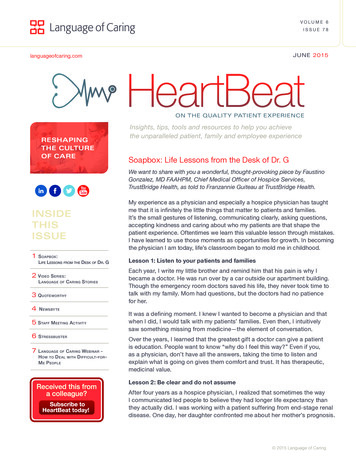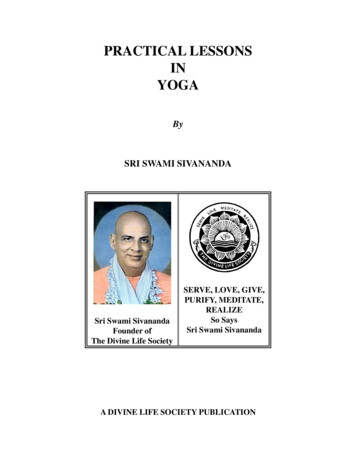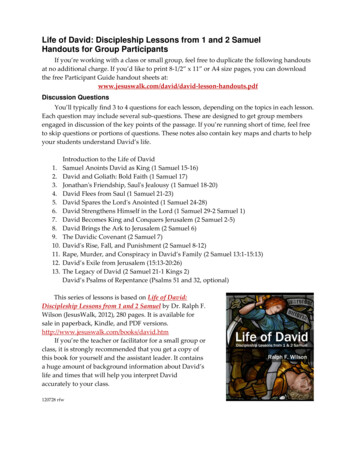
Transcription
Life of David: Discipleship Lessons from 1 and 2 SamuelHandouts for Group ParticipantsIf you’re working with a class or small group, feel free to duplicate the following handoutsat no additional charge. If you’d like to print 8‐1/2” x 11” or A4 size pages, you can downloadthe free Participant Guide handout sheets ts.pdfDiscussion QuestionsYou’ll typically find 3 to 4 questions for each lesson, depending on the topics in each lesson.Each question may include several sub‐questions. These are designed to get group membersengaged in discussion of the key points of the passage. If you’re running short of time, feel freeto skip questions or portions of questions. These notes also contain key maps and charts to helpyour students understand David’s life.1.2.3.4.5.6.7.8.9.10.11.12.13.Introduction to the Life of DavidSamuel Anoints David as King (1 Samuel 15‐16)David and Goliath: Bold Faith (1 Samuel 17)Jonathanʹs Friendship, Saulʹs Jealousy (1 Samuel 18‐20)David Flees from Saul (1 Samuel 21‐23)David Spares the Lordʹs Anointed (1 Samuel 24‐28)David Strengthens Himself in the Lord (1 Samuel 29‐2 Samuel 1)David Becomes King and Conquers Jerusalem (2 Samuel 2‐5)David Brings the Ark to Jerusalem (2 Samuel 6)The Davidic Covenant (2 Samuel 7)Davidʹs Rise, Fall, and Punishment (2 Samuel 8‐12)Rape, Murder, and Conspiracy in David’s Family (2 Samuel 13:1‐15:13)David’s Exile from Jerusalem (15:13‐20:26)The Legacy of David (2 Samuel 21‐1 Kings 2)David’s Psalms of Repentance (Psalms 51 and 32, optional)This series of lessons is based on Life of David:Discipleship Lessons from 1 and 2 Samuel by Dr. Ralph F.Wilson (JesusWalk, 2012), 280 pages. It is available forsale in paperback, Kindle, and PDF f you’re the teacher or facilitator for a small group orclass, it is strongly recommended that you get a copy ofthis book for yourself and the assistant leader. It containsa huge amount of background information about David’slife and times that will help you interpret Davidaccurately to your class.120728 rfw
Life of David: Discipleship Lessons. Handouts for Group Participants2Introduction to the Life of DavidDate for David’s 40‐year reign from about 1010 to 970 BC.Archaeological inscriptions pointing to the historicity of King David’s reign:1. Inscription from an Old Aramaic stela in Tell Dan (dated about 840 BC) refers to the“House of David” in the context of a king.2. Inscription on the stela of Mesha King of Moab also refers to the “House of David” inabout the same period.3. An inscription at Karnak by Pharaoh Shoshenq I records a victory over Rehoboam andJeroboam in 926/925 BC referring to a place name in the Negev or south Judean area asthe “heights of David,” an inscription carved within 50 years of David’s own lifetime.Composition and Authorship of Samuel and ChroniclesOur primary source material for the study of David’s life is found in 1 and 2 Samuel andthe first chapter of 1 Kings, with some supplementary information in 1 Chronicles.First and Second Samuel are actually part of one book in the Hebrew Bible, along with 1and 2 Kings. Composition is seen as the work of one or more editors, perhaps first in the time ofJosiah and then again during the exile. They drew on ancient source documents.1 and 2 Chronicles were probably written sometime after the return from exile, as early as527 BC and perhaps up to a century later.Who Were the Philistines?The Philistines apparently immigrated from the Aegean area in the early to mid‐twelfthcentury BC. They settled primarily along the southwestern coastal strip of Canaan, the name“Palestine” deriving from the name “Philistine.” They seem to have been a loose confederationof five city‐states: Ashdod, Ashkelon, Ekron, Gaza, and Gath (Joshua 13:3b). For the most partthese city‐states waged war singly, but on occasion they gathered together to wage a commonbattle. Gath is probably to be identified with Tell es‐Safi.From Ralph F. Wilson, Life of David: Discipleship Lessons from 1 and 2 Samuel (JesusWalk, 2012). Copyright 2012, Ralph F. Wilson pastor@joyfulheart.com . All rights reserved. http://www.jesuswalk.com/books/david.htm Permission is granted to make copiesof these participant handouts, one set for each member of a local group, at no charge, with copyright info on each page.
Life of David: Discipleship Lessons. Handouts for Group Participants3Approximate Chronology of David’s LifeDate1040 BC101210101003David’s Age‐ 15‐20 25‐303037 37‐47 47 47 45‐50 47‐52 52‐57 54‐59 56‐61 61970 62 62‐63 65‐67 6970EventDavid bornDavid and GoliathDavid is a fugitive from SaulDavid becomes king at HebronDavid becomes king over all Israel andconquers JerusalemPalace built, Philistine and ArameancampaignsDavid’s kingdom establishedDavid sins with BathshebaAmnon rapes TamarAbsalom kills Amnon, flees to Geshur, stays3 yearsAbsalom returns to JerusalemAbsalom sees David’s face after 2 years inJerusalemAbsalom wins the hearts of Israel over 4yearsAbsalom becomes king in Hebron, Davidflees JerusalemAbsalom killedSheba’s rebellionDavid becomes exhausted in Philistine battleAdonijah and Solomon vie for the throne.David diesReference2 Samuel 5:42 Samuel 5:4‐52 Samuel 5:4‐52 Samuel 13:382 Samuel 14:282 Samuel 14:282 Samuel 15:72 Sam 21:152 Samuel 5:4‐5; cf. 1Kings 2:11From Ralph F. Wilson, Life of David: Discipleship Lessons from 1 and 2 Samuel (JesusWalk, 2012). Copyright 2012, Ralph F. Wilson pastor@joyfulheart.com . All rights reserved. http://www.jesuswalk.com/books/david.htm Permission is granted to make copiesof these participant handouts, one set for each member of a local group, at no charge, with copyright info on each page.
Life of David: Discipleship Lessons. Handouts for Group Participants41. Samuel Anoints David as King (1 Samuel 15-16)Q1. (1 Samuel 15:22‐23). What is rebellion? Inwhat way is rebellion as bad as witchcraft oroccult practices? What does rebellion have to dowith arrogance? What can we do when we findrebellion against God in our hearts? Whathappens if we do nothing?Q2. (1 Samuel 16:3‐12) How does this storyteach us the importance of listening carefully toGod’s voice? What is our instinctive way ofdiscerning? How is God teaching us to discern?How do we learn to listen to the Spirit?Q3. (1 Samuel 1:13) What is the significance of Samuel anointingDavid? What is the significance of the Holy Spirit coming uponDavid? How does this explain his success? How is the Holy Spiritupon us vital for our own success as disciples?Q4. (1 Samuel 16:14‐23) From Saul’s perspective, why is Davidsummoned to court? From God’s perspective, what seem to be thereasons for this service in Saul’s court? What things tend to preventus from learning from God in the midst of the circumstances in whichwe find ourselves? What might make us more teachable?Discipleship Lessons1. Obedience. Negative lesson from Saul: as we grow asdisciples, we must outgrow our tendency to self‐will andDetail of Jewish kinnor playeris found in a bas-relief in therebellion.palace of Assurbanipal (7052. Listening. From Samuel we learn the importance of listening681 BC) at Nineveh,portraying the fall of thecarefully to the voice of the Spirit.Judean city of Lachish.3. The Holy Spirit. From David: Being responsive to the HolySpirit is the key to success as a king or a prophet – or in any venture God calls us to.4. God’s Arrangements. God uses “chance” opportunities to work out his will. Questionshouldn’t be: “Why, Lord?” but “What do you want me to learn here?”Key Verses“Does the LORD delight in burnt offerings and sacrificesas much as in obeying the voice of the LORD?To obey is better than sacrifice,and to heed is better than the fat of rams.23 For rebellion is like the sin of divination,and arrogance like the evil of idolatry.” (1 Samuel 15:22‐23a)“The LORD does not look at the things man looks at.Man looks at the outward appearance,but the LORD looks at the heart.” (1 Samuel 16:7b)“So Samuel took the horn of oil and anointed him in the presence of his brothers, and from thatday on the Spirit of the LORD came upon David in power.” (1 Samuel 16:13)From Ralph F. Wilson, Life of David: Discipleship Lessons from 1 and 2 Samuel (JesusWalk, 2012). Copyright 2012, Ralph F. Wilson pastor@joyfulheart.com . All rights reserved. http://www.jesuswalk.com/books/david.htm Permission is granted to make copiesof these participant handouts, one set for each member of a local group, at no charge, with copyright info on each page.
Life of David: Discipleship Lessons. Handouts for Group Participants52. David and Goliath: Bold Faith (1 Samuel 17)Q1. (1 Samuel 17:26‐30) Why isDavid so upset about Goliath’staunt? Why is Eliab, David’s brother,so upset with David? What does thisteach us about David’s faith? Whatdoes it teach us about Eliab’scharacter?Asiatic or Persian Lion (Felis leopersica). Males 350 to 420 pounds;females 240 to 260 pounds.Syrian Brown Bear (Ursus arctossyriacus). Length up to 8’. Shoulderheight 35‐43”. Males 220 to 660 lb;females 2/3rds.Q2. (1 Samuel 17:34‐37) Whatdoes David’s explanation to Saul ofhis combat experience say aboutDavid’s faith? How lethal is Davidas a warrior? Why do you think Saulallows him to go out to battle Goliath? Does Saul havefaith? If so, what i the source of it?Sling stones from battle of Lachish, limestone, round,1‐3/4 to 2‐1/3 inches, speed perhaps 100 miles per hour!The Battle is the Lords! 1 Samuel 14:6b; 2 Chronicles20:15; 32:8; Psalm 33:16‐18, 20; 44:6‐8; Proverbs 21:30‐31;Hosea 1:7; Zechariah 4:6; Romans 8:31, 37; 1 John 4:4.Q3. (1 Samuel 17:47) Why do we so often forget that“the battle is the Lord’s”? What does that phrase actuallymean? How can we avoid the arrogance of pulling Godinto our battles (“God is on my side”), rather than engagingin His battles (“I am on God’s side”)?Sling stones from the battle of Lachish,Judah (701 BC). British Museum.Disciple Lessons from David and Goliath1. Faith vs. fear. We need to be motivated primarily by our faith, not hindered from actionby our fears.2. God’s glory is more important than our own victory. David is concerned for God’sreputation, not his own.3. The battle is the Lord’s. So often we think we’re alone in what we’re facing. But if we’reliving for God, he is present no matter what is going on in our lives. And if the causeaffects his kingdom and his glory, it is His battle, not ours at all.4. Importance of preparation. Even though we rely on the Spirit, we are not so foolish asto make no preparation. As St. Augustine once said, “Pray as though everythingFrom Ralph F. Wilson, Life of David: Discipleship Lessons from 1 and 2 Samuel (JesusWalk, 2012). Copyright 2012, Ralph F. Wilson pastor@joyfulheart.com . All rights reserved. http://www.jesuswalk.com/books/david.htm Permission is granted to make copiesof these participant handouts, one set for each member of a local group, at no charge, with copyright info on each page.
Life of David: Discipleship Lessons. Handouts for Group Participantsdepended on God. Work as though everything depended on you.” Faith andpreparation are not mutually exclusive.Key Verses“Your servant has killed both the lion and the bear; this uncircumcised Philistine will be like oneof them, because he has defied the armies of the living God. The LORD who delivered me from thepaw of the lion and the paw of the bear will deliver me from the hand of this Philistine.” (1 Samuel17:36‐37)“You come against me with sword and spear and javelin, but I come against you in the name ofthe LORD Almighty, the God of the armies of Israel, whom you have defied.” (1 Samuel 17:45)“All those gathered here will know that it is not by sword or spear that the LORD saves; for thebattle is the LORD’s, and he will give all of you into our hands.” (1 Samuel 17:47)From Ralph F. Wilson, Life of David: Discipleship Lessons from 1 and 2 Samuel (JesusWalk, 2012). Copyright 2012, Ralph F. Wilson pastor@joyfulheart.com . All rights reserved. http://www.jesuswalk.com/books/david.htm Permission is granted to make copiesof these participant handouts, one set for each member of a local group, at no charge, with copyright info on each page.6
Life of David: Discipleship Lessons. Handouts for Group Participants73. Jonathan’s Friendship, Saul’s Jealousy (1 Samuel 18-20)Q1. (1 Samuel 18:13‐16). Why does Saul send David into battle? What is the result? To whatdoes the narrator attribute David’s success?Q2. (1 Samuel 18:18‐22) Which of the following is David’s chief motive for marryingMichal, in your opinion? Argue for the motivation that makes the most sense to you: (1) pride inhis military prowess, (2) obedience to Saul’s desires, (3) love or desire for Michal, or (4)enjoyment in killing Philistines.Q3. (1 Samuel 19:18‐24) What does it tell us about Saul’s faith that he pursues David evenwhen he has sought the sanctuary of the prophet Samuel? Why do people prophesy when theHoly Spirit comes upon them? What is the relationship between this incident and the Day ofPentecost (Acts 2)?Q4. (1 Samuel 20:35‐42) What is the nature of the covenant between David and Jonathan?What does David receive? What does Jonathan receive? Who benefits the most from thiscovenant? Is it self‐serving – or not? What is the significance that God is witness to thecovenant?Disciple Lessons1. Male friendships. There can be deep, tender friendships between men without a hint ofsexual attraction. This is a lesson that needs to be heard by our culture. Men don’t needto be afraid of or apologetic for their love for other men.2. Fear and jealousy, if we let them have a place in our lives, are evil and can be extremelydestructive to those around us.3. Covenants or promises between people can endure. God, who is witness to ourpromises, calls us to a high standard in keeping them.4. Enemies. Living a righteous life doesn’t make us immune to others seeing themselves asour enemies. We are responsible for our own lives, but we can’t be responsible for others’reactions to us. Our motives may be pure, but that doesn’t keep others from hating us. Ithappens to the best of us – perhaps especially to the best.Key Verses“After David had finished talking with Saul, Jonathan became one in spirit with David, and heloved him as himself.” (1 Samuel 18:1)“When the men were returning home after David had killed the Philistine, the women came outfrom all the towns of Israel to meet King Saul with singing and dancing, with joyful songs and withtambourines and lutes. As they danced, they sang: ‘Saul has slain his thousands, and David his tens ofthousands.’” (1 Samuel 18:6‐7)“Saul was afraid of David, because the LORD was with David but had left Saul.” (1 Samuel 18:12)“Jonathan said to David, ‘Go in peace, for we have sworn friendship with each other in the nameof the LORD, saying, ‘The LORD is witness between you and me, and between your descendants andmy descendants forever.’” (1 Samuel 20:42)From Ralph F. Wilson, Life of David: Discipleship Lessons from 1 and 2 Samuel (JesusWalk, 2012). Copyright 2012, Ralph F. Wilson pastor@joyfulheart.com . All rights reserved. http://www.jesuswalk.com/books/david.htm Permission is granted to make copiesof these participant handouts, one set for each member of a local group, at no charge, with copyright info on each page.
Life of David: Discipleship Lessons. Handouts for Group Participants4. David Flees from Saul (1 Samuel 21-23)Q1. (1 Samuel 22:2) Why were David’s menattracted to him? What did they have in common?Why kind of men were these? What difficulties doyou think David probably had in leading them?Q2. (1 Samuel 22:20‐23:12) What did Abiatharand the ephod have to do with “inquiring of theLord?” Why did David inquire of the Lord? Whathuge advantage does the person have who seeksGod’s will before acting? How can you find God’swill at key points in your life?Psalms from this time: 31:2‐4; 18:1‐3, 29, 33; 63:1, 4‐8Q3. (1 Samuel 23:14‐18) Why does Jonathanvisit David in the wilderness? What risk is there for David? What risk is there for Jonathan?What do you think it meant to David? Have you ever received a visit from a friend when youneeded it most?From Ralph F. Wilson, Life of David: Discipleship Lessons from 1 and 2 Samuel (JesusWalk, 2012). Copyright 2012, Ralph F. Wilson pastor@joyfulheart.com . All rights reserved. http://www.jesuswalk.com/books/david.htm Permission is granted to make copiesof these participant handouts, one set for each member of a local group, at no charge, with copyright info on each page.8
Life of David: Discipleship Lessons. Handouts for Group ParticipantsHistorical Ascriptions of the Psalms of DavidPsalm 59. “When Saul had sent men to watch David’s house in orderto kill him.”Psalm 56. “When the Philistines had seized him in Gath.”21:12‐15Psalm 34. “When he pretended to be insane before Abimelech, who21:13‐15drove him away, and he left.” A beautiful acrostic psalm.Psalm 52. “When Doeg the Edomite had gone to Saul and told him,22:9‐10‘David has gone to the house of Ahimelech.’”Psalm 57. “When he had fled from Saul into the cave.”22:1Psalm 142. “When he was in the cave.”22:122:5; 23:14‐16, 23f Psalm 63. “When he was in the Desert of Judah.”Psalm 54. “When the Ziphites had gone to Saul and said, ‘Is not23:19David hiding among us?’”Psalm 18. “He sang to the LORD the words of this song when theChapter 22LORD delivered him from the hand of all his enemies and from thehand of Saul.”2 Samuel 8:13‐14 Psalm 60. “When he fought Aram Naharaim and Aram Zobah, andwhen Joab returned and struck down twelve thousand Edomites inthe Valley of Salt.”Psalm 51. “When the prophet Nathan came to him after David had12:13committed adultery with Bathsheba.”Psalm 3. “When he fled from his son Absalom.”Chapter 15Q4. (Psalms 18, 34, 54, 56, 58, 59, 142) In these ascriptions to these psalms, how manycelebrate happy occasions? How many arise from struggles? What does this tell you aboutDavid’s relationship with God? What does this tell you about his faith during trials? Which isyour favorite among these psalms? Why?1 Samuel 19:11Lessons for Disciples1. Provision. God provides for his servants, even in times of desperate need, as Davidfound bread and a sword in the house of the Lord.2. God’s fashioning. Every great person has times of seeming failure, as well as times ofsuccess and adulation. Don’t judge too soon that God has forgotten you. He is moldingyou into a finely‐crafted instrument that he can use in his work.3. Leaders. Leaders tend to attract followers when they are struggling as well as whenthey’re on top, as David gathered a band of mighty men in the wilderness. Look for aperson that people are following and you’ll find a leader.4. Learning. Times of struggle are often when you learn the most and do your best work.Don’t discount the difficulties you face in your wilderness as wasted time.5. Guidance. The ability to seek God’s will is a very precious gift. David had this in thepresence of the Urim and the Thummim, the company of a prophet, and his ownprophetic gift. You can find God’s will if you seek him with all your heart, since, ifyou’re a Christian, you possess the Holy Spirit of God who connects you with the verymind of Christ (1 Corinthians 2:10‐16).From Ralph F. Wilson, Life of David: Discipleship Lessons from 1 and 2 Samuel (JesusWalk, 2012). Copyright 2012, Ralph F. Wilson pastor@joyfulheart.com . All rights reserved. http://www.jesuswalk.com/books/david.htm Permission is granted to make copiesof these participant handouts, one set for each member of a local group, at no charge, with copyright info on each page.9
Life of David: Discipleship Lessons. Handouts for Group Participants106. Betrayal. Even people you have helped may well betray you, as the residents of Keilahand Ziph will betray David. You will meet disappointment. But don’t despair! You havean unshakable Rock, the Lord your God. He will never leave you or forsake you(Hebrews 13:5)!7. Praise. We are to praise God in all circumstances (1 Thessalonians 5:16‐18), as David didin many of his Wilderness‐era psalms. Our joy is in the Lord himself, not in whethereverything is going well or not.Key Verses“David left Gath and escaped to the cave of Adullam. When his brothers and his father’shousehold heard about it, they went down to him there. All those who were in distress or in debt ordiscontented gathered around him, and he became their leader. About four hundred men were withhim.” (1 Samuel 22:1‐2)“Once again David inquired of the LORD, and the LORD answered him, ‘Go down to Keilah, forI am going to give the Philistines into your hand.’ . (Now Abiathar son of Ahimelech had broughtthe ephod down with him when he fled to David at Keilah.)” (1 Samuel 23:4, 6)“David stayed in the desert strongholds and in the hills of the Desert of Ziph. Day after day Saulsearched for him, but God did not give David into his hands.” (1 Samuel 23:14)From Ralph F. Wilson, Life of David: Discipleship Lessons from 1 and 2 Samuel (JesusWalk, 2012). Copyright 2012, Ralph F. Wilson pastor@joyfulheart.com . All rights reserved. http://www.jesuswalk.com/books/david.htm Permission is granted to make copiesof these participant handouts, one set for each member of a local group, at no charge, with copyright info on each page.
Life of David: Discipleship Lessons. Handouts for Group Participants115. David Spares the Lord’s Anointed (1 Samuel 24-28)Q1. (1 Samuel 24:1‐15) Why doesn’t David kill Saul when he has the chance? What motivedo he and his men have for killing a king who is trying to kill them? What is David’s rationalefor sparing Saul? What does this tell us about David’s character? About his faith? What does itsay about David’s leadership ability that he is able to dissuade his men from killing Saul?Lifting one’s hand against the Lord’s anointed” ‐‐ Genesis 20:7; 31:24; Psalm 105:15; cf. 1Chronicles 16:22; Matthew 10:40‐42; 1 Timothy 5:17, 19‐20; Acts 23:5b, quoting Exodus 22:28)Q2. (1 Samuel 24:12) How do we apply the principle of not lifting a hand against the Lord’sanointed in our day? What provisions are there in 1 Timothy 5:19‐20 for calling leaders toaccount. What do you think God will do to those who slander, persecute, and martyr hisappointed leaders?Bloodguilt“You shall not murder” (Exodus 20:13), that is, commit unlawful killing. The word“murder” (NIV, NRSV) or “kill” is rāṣaḥ, “murder, slay, kill.” According to Numbers 35, theperson who has accidentally killed someone can find sanctuary in a “city of refuge,” where hecan’t be killed by a relative, an “avenger of blood,” before his case is heard in a court of law,before he “stands trial before the assembly” (Numbers 35:12). Numbers gives guidelines fordetermining whether a person was killed purposely or accidentally, whether the killer actedwith hostility or “malice aforethought” (Numbers 35:21). This chapter concludes:“Do not pollute the land where you are. Bloodshed pollutes the land, and atonement cannot bemade for the land on which blood has been shed, except by the blood of the one who shed it. Do notdefile the land where you live and where I dwell, for I, the LORD, dwell among the Israelites.”(Numbers 35:33‐34)See also Genesis 4; 9:5‐6; Exodus 22:2‐3; 2 Samuel 4:11; 1 Kings 2:5; 2 Samuel 12:9“Save me from bloodguilt,O God, the God who saves me,and my tongue will sing of your righteousness.” (Psalm 51:14)Q3. (1 Samuel 25) What do we learn about David’s character in this incident with Nabaland Abigail? What do we learn about Abigail’s character? Nabal’s character? Why do you thinkthis story was included in 1 Samuel? What important knowledge does it add to ourunderstanding?Occult Practices in the Ancient Near East1. Hepatoscopy, divination by inspecting the liver of a sacrificed animal (Ezekiel 21:21), awidespread practice. Archaeologists have found clay models of livers at Megiddo andelsewhere.2. Hydromancy, divining by water, perhaps seen in Genesis 44:5.3. Rhabdomancy, divination using a divining rod (Hosea 4:12)4. Belomancy, divination by casting of arrows (Ezekiel 21:21).From Ralph F. Wilson, Life of David: Discipleship Lessons from 1 and 2 Samuel (JesusWalk, 2012). Copyright 2012, Ralph F. Wilson pastor@joyfulheart.com . All rights reserved. http://www.jesuswalk.com/books/david.htm Permission is granted to make copiesof these participant handouts, one set for each member of a local group, at no charge, with copyright info on each page.
Life of David: Discipleship Lessons. Handouts for Group Participants125. Teraphim, household gods or images, widespread in the ancient Near East, used as asymbol of authority, land ownership, and for divination (Ezekiel 21:21; Zechariah 10:2).6. Astrology, common in Babylon, seeking the future in the stars and planets (Isaiah 47:13;Jeremiah 10:2).7. Necromancy, consultation with the dead to determine the future, as is practiced by the“witch of Endor.”Condemned: Leviticus 19:31; 20:27; Deuteronomy 18:10‐11; Acts 8:9‐24; 13:6‐12, 16‐18; 19:18‐19;1 Corinthians 10:20‐21; Revelation 9:21; 21:8; 22:15.Q4. (1 Samuel 28:7‐14) Why do you think God condemns occult practices of communicatingwith the dead and channeling spirits of the dead? How might such practices open Christians tovictimization and oppression by evil spirits? What should you do if you’ve been involved insuch practices in the past?Lessons for Disciples1. Respect. We are to respect the leaders that God has appointed over us, even if theyaren’t perfect – which they never are (Hebrews 13:17a). David had respect for Saul as theLord’s anointed. God will judge those who rebel against His leaders, slander them, orspeak evil of them (Acts 23:5b; Exodus 22:28).2. Appeal. We can, however, respectfully disagree with our leaders, as David did beforeSaul, and appeal to their reason. And we can also appeal to God when a leader is out ofline. God, who put the leader in place can (and perhaps will) remove that leader.Leaders must answer to God! (Hebrews 13:17b).3. Humility. When we humble ourselves before a leader about to make a mistake, likeAbigail did before David, and speak clearly and boldly, we can sometimes influence theFrom Ralph F. Wilson, Life of David: Discipleship Lessons from 1 and 2 Samuel (JesusWalk, 2012). Copyright 2012, Ralph F. Wilson pastor@joyfulheart.com . All rights reserved. http://www.jesuswalk.com/books/david.htm Permission is granted to make copiesof these participant handouts, one set for each member of a local group, at no charge, with copyright info on each page.
Life of David: Discipleship Lessons. Handouts for Group Participants13outcome positively. Humility is appropriate for two reasons. First, leaders often strugglewith pride. Second, we don’t see everything the leader sees and may be wrong in ourassessment.4. Steadfastness. When God shows us one of his principles, we must stand up for it, evenif others don’t understand us or criticize us, as David’s men did when he spared Saul.We aren’t to cave in under pressure.5. Faithfulness. When we make a promise, we must do our very best to be true to ourword, not like Saul, whose promise not to harm David was made and broken again andagain. Neither God nor man have respect for a person who makes a promise and thenchanges his mind and does the opposite.6. The Occult. We are to stay away from occult practices of any kind, and thoroughlyrepent of any involvement in the past that may have contaminated us spiritually ormade us vulnerable to Satan’s deception or oppression.Key Verses“[David] said to his men, ‘The LORD forbid that I should do such a thing to my master, theLORD’s anointed, or lift my hand against him; for he is the anointed of the LORD.’ With these wordsDavid rebuked his men and did not allow them to attack Saul. And Saul left the cave and went hisway.” (1 Samuel 24:6‐7)“May the LORD judge between you and me. And may the LORD avenge the wrongs you havedone to me, but my hand will not touch you.” (1 Samuel 24:12)“David said to Abigail, ‘Praise be to the LORD, the God of Israel, who has sent you today to meetme. May you be blessed for your good judgment and for keeping me from bloodshed this day andfrom avenging myself with my own hands.’” (1 Samuel 25:32‐33)From Ralph F. Wilson, Life of David: Discipleship Lessons from 1 and 2 Samuel (JesusWalk, 2012). Copyright 2012, Ralph F. Wilson pastor@joyfulheart.com . All rights reserved. http://www.jesuswalk.com/books/david.htm Permission is granted to make copiesof these participant handouts, one set for each member of a local group, at no charge, with copyright info on each page.
Life of David: Discipleship Lessons. Handouts for Group Participants146. David Strengthens Himself in the Lord (1 Samuel 29-2 Samuel 1)Q1. (1 Samuel 30:1‐6) Why do the men blame David? Why is the situation so explosive atthis point. What does David do in thesituation? What is David feeling? Whydoesn’t he act immediately?Scripture: Psalm 18:6a; 27:1‐2; 34:1‐6;40:1‐3; 42:1‐6a; 56:1‐4; 62:1‐2Q2. (1 Samuel 30:6) From the Psalms ofDavid, how does David seem to strengthenhimself in the Lord when things are goingbad? What devotional exercises does headopt? What is the focus of his faith?Q3. (2 Samuel 1:19‐27; 1 Chronicles10:13‐14) David is gracious in his memorialpsalm. How does he remember Saul’s life?How does the Chronicler remember Saul’slife? How do you think God evaluatesSaul’s life? What do we learn from this?Lessons for Disciples1. We must learn to strengthenourselves in the Lord when our livesseem like they’re falling apart. Thereare many examples of how to dothis in David’s Psalms.2. When we can, we should share theLord’s bounty with others, evenwith those who may not deserve it.3. We need to learn to die well so that our epitaph brings gloryto the Lord, rather than disgrace.Key Verses“David was greatly distressed because the men were talking ofstoning him; each one was bitter in spirit because of his sons anddaughters. But David found strength in the LORD
Our primary source material for the study of David’s life is found in 1 and 2 Samuel and the first chapter of 1 Kings, with some supplementary information in 1 Chronicles. First and Second Samuel are actually part of one book in the
